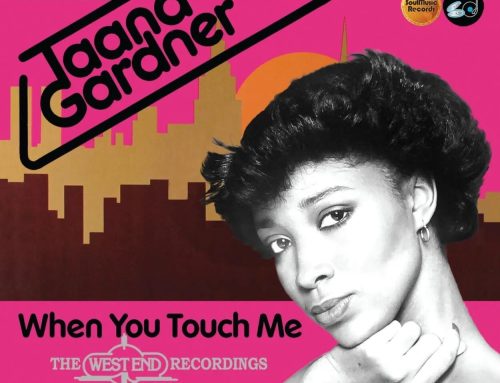Motown reissues have been few and far between these past months (years?), so when we see one is due to be released, a huge ‘whoop whoop’ goes out across the land. The one that’s featured here has been a secret since last December when I first learned of its existence, due in part to my involvement with “The Tears Of A Clown,” a story that’s been told several times so won’t dwell on that here. Instead, let’s cram in as much as possible about the wonderful release that is “Smokey Robinson & The Miracles”, the umbrella for four glorious albums. This definitive 2CD remastered package from SoulMusic Records/The Second Disc features four rare and in-demand albums with a couple of bonus tracks thrown in for good measure.
First things first, the featured albums, “A Pocketful Of Miracles” from 1970, “One Dozen Roses”, 1971, and “Flying High Together”, 1972, are making their global debut as CDs, while “What Love Has Joined Together” from 1970 has been unavailable for years. The before mentioned bonus tracks, “(You’ve Got Me) Looking Through The Eyes Of Love” and “Paper People”, previously available as digital releases, are also debuting on CD for the first time.
Now before getting to the nitty-gritty, let’s do a little house keeping. All four CDs feature the classic group membership – Smokey and his wife Claudette, Bobby Rogers, Ronnie White, Pete Moore, rounded off by guitarist Marv Tarplin, who Smokey nicked from The Supremes when they were known as The Primettes. He’s also referred to as The Miracles’ ‘secret weapon’ and he stayed with them until 1973. I believe he was replaced by Donald Griffin, brother of Billy who, as you know, stepped into Smokey’s empty shoes. Mind you, Marv Tarplin and Smokey continued to work together when the latter later decided he didn’t like retirement after all, wanting to try his hand at a solo career. Anyway, that’s in the future. Back to the story at hand.
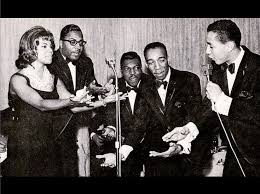
 “Hi…We’re The Miracles” was the group’s debut album during June 1961, with tracks ranging from upbeat R&B with “Way Over There” to the doo-wop sounding “Who’s Lovin’ You”; the blues-soaked “Your Love”, with covers of Marv Johnson’s “Don’t Leave Me” and Barrett Strong’s “Money (That’s What I Want)” thrown in for good measure. But, the most outstanding and important track was, of course, “Shop Around”, Motown and The Miracles’ first million-selling hit and first US chart topper.
“Hi…We’re The Miracles” was the group’s debut album during June 1961, with tracks ranging from upbeat R&B with “Way Over There” to the doo-wop sounding “Who’s Lovin’ You”; the blues-soaked “Your Love”, with covers of Marv Johnson’s “Don’t Leave Me” and Barrett Strong’s “Money (That’s What I Want)” thrown in for good measure. But, the most outstanding and important track was, of course, “Shop Around”, Motown and The Miracles’ first million-selling hit and first US chart topper.
“Cookin’ With The Miracles”, “I’ll Try Something New”, “The Fabulous Miracles” and “The Miracles Doin’ Mickey’s Monkey” were some of the albums leading up to the release of their 1970 outing “What Love Has Joined Together”.
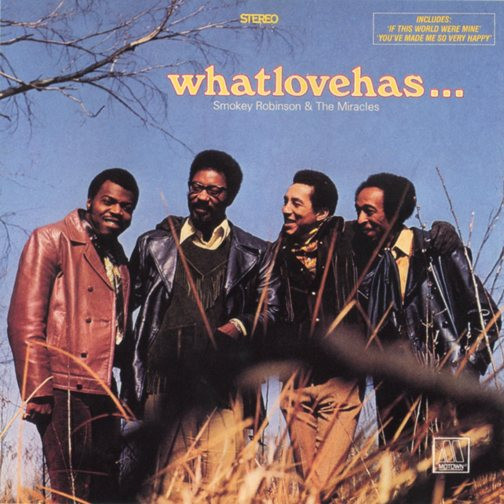 With a mere six tracks on offer, this album was a concept-of-sorts encompassing one of our strongest emotions – love – via songs that were, bar one, all re-inventions, including “My Cherie Amour”, “If This World Were Mine”, “You’ve Made Me So Very Happy” and “And I Love Her”.
With a mere six tracks on offer, this album was a concept-of-sorts encompassing one of our strongest emotions – love – via songs that were, bar one, all re-inventions, including “My Cherie Amour”, “If This World Were Mine”, “You’ve Made Me So Very Happy” and “And I Love Her”.
The title track was the exception, being penned by Smokey and Bobby Rogers. In the excellent notes by Joe Marchese of The Second Disc for this new CD package, Claudette said, “I thought (the album) was unique and a little bit different, including the cover. ‘What Love Has…’ then you flip it over, and there’s ‘Joined Together’ with me on the back!” “A stunning concept album that should have fared better” and “one of the rare jewels in the Motown label’s crown” were among the press reviews.
Probably the most unexpected hit of 1970 was “The Tears Of A Clown”, Smokey and the Miracles first UK chart topper, whereupon it was released in their home country with equal success, and where it sold over one million copies. In the UK, on the Tamla Motown label, the group’s “A Pocket Full Of Miracles” was re-named “Smokey Robinson And The Miracles” which featured the number one and its follow-up “(Come Round Here) I’m The One You Need”, a top twenty hit in early 1971.
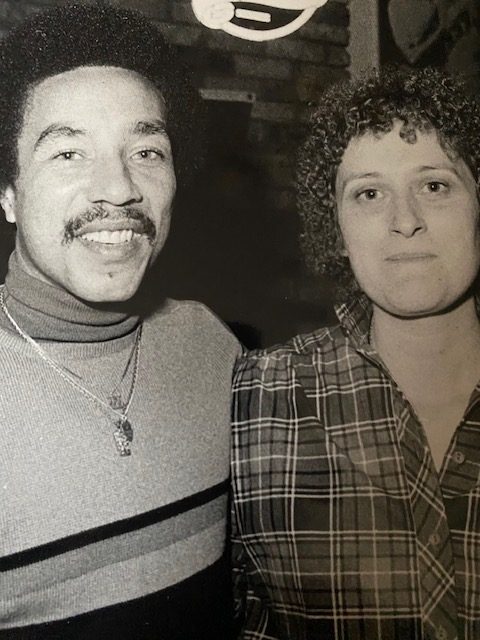 I suppose it was understandable that the front cover showed Smokey’s face over-painted with clown make-up. Looking at it now, erm, could have done better! “I’m really happy with the success but I can’t make out what happened because all the singles we’ve been having success with are from old albums,” a bemused Smokey said at the time. “It’s got me thinking that I should re-service all our old stuff and do nothing new. Seriously though, it’s given me a good idea of what people want from us, and the success has certainly shown me what direction we need to take because until now I wasn’t sure what to do.” It didn’t take him long to produce the newly-composed, deliberate soundalike “I Don’t Blame You At All” for the American follow-up.
I suppose it was understandable that the front cover showed Smokey’s face over-painted with clown make-up. Looking at it now, erm, could have done better! “I’m really happy with the success but I can’t make out what happened because all the singles we’ve been having success with are from old albums,” a bemused Smokey said at the time. “It’s got me thinking that I should re-service all our old stuff and do nothing new. Seriously though, it’s given me a good idea of what people want from us, and the success has certainly shown me what direction we need to take because until now I wasn’t sure what to do.” It didn’t take him long to produce the newly-composed, deliberate soundalike “I Don’t Blame You At All” for the American follow-up.
After the single’s surprise phenomenal success, Smokey’s plans to retire from the music business were thwarted. “It turned out to be The Miracles biggest record ever, selling some three million copies,” he wrote in his autobiography Inside My Soul. “That was great but it also put me in a bind. As a group, we were hotter than ever. Our performance fee zoomed to $25,000 a night. Big money back then.”
So, he was persuaded to tour for another year with The Miracles to get them “financially straight”. But he hated it: he hated every aspect of touring – from leaving home, the hotels, the travelling and so on. Finally a date was set in 1972 for his last group performance at the Carter Barron Amphitheatre in Washington DC. “I went out on stage and, though I’d been trying to quit for years, a sadness suddenly engulfed me, an awesome feeling of loss and regret. I was being bubbly for the fans, singing and dancing, but I was dying inside, feeling like the character in ‘The Tears Of A Clown’, smiling through my pain.” Ronnie White said, “I looked at the split from an optimistic viewpoint. It gave us an opportunity to …… explore and see what we could do on our own. It was a fantastic challenge.”
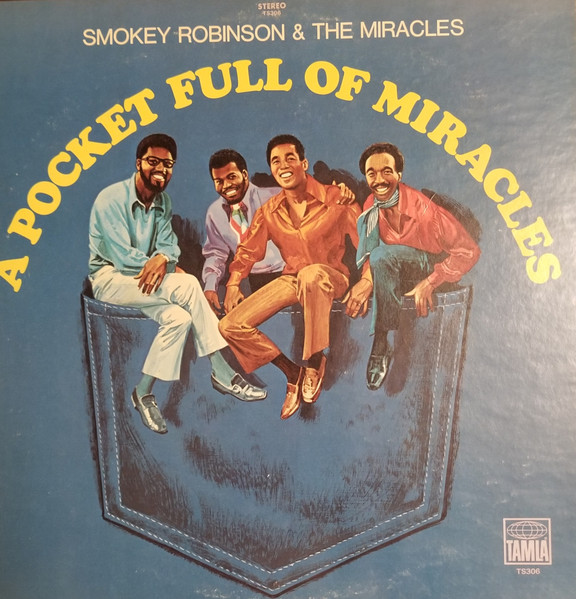 I digressed but am now back on line: with producers including Smokey and Ashford & Simpson, “A Pocket Full Of Miracles” – so named with a nod to the 1961 Frank Cappa movie “Pocketful Of Miracles” – comprised the lead Miracle taking the reins on a rather powerful revival of “Get Ready” which he wrote for The Temptations, who did an ace job on the uptempo track. Then there’s the frantic “Backfire”, and a medley of Chris Kenner’s New Orleans R&B standard “Something You Got” and The Beatles’ soothing “Something” which led Smokey to say one time, “The Beatles wrote some wonderful songs and we used to sing a few of them. That was one of them.” Two songs were culled for singles, namely, the upbeat “Point It Out” and a melancholy “Who’s Gonna Take The Blame”. Oh, before moving on, I need to mention that although Claudette wasn’t pictured on the album’s sleeve, she was featured as a vocalist.
I digressed but am now back on line: with producers including Smokey and Ashford & Simpson, “A Pocket Full Of Miracles” – so named with a nod to the 1961 Frank Cappa movie “Pocketful Of Miracles” – comprised the lead Miracle taking the reins on a rather powerful revival of “Get Ready” which he wrote for The Temptations, who did an ace job on the uptempo track. Then there’s the frantic “Backfire”, and a medley of Chris Kenner’s New Orleans R&B standard “Something You Got” and The Beatles’ soothing “Something” which led Smokey to say one time, “The Beatles wrote some wonderful songs and we used to sing a few of them. That was one of them.” Two songs were culled for singles, namely, the upbeat “Point It Out” and a melancholy “Who’s Gonna Take The Blame”. Oh, before moving on, I need to mention that although Claudette wasn’t pictured on the album’s sleeve, she was featured as a vocalist.
Following the US success of “The Tears Of A Clown”, Berry Gordy Jr. was taking no chances and included it on “One Dozen Roses”. It complimented “I Don’t Blame You At All” and “Crazy About The La La La” with its driving beat and Smokey’s playful lyrics, while “Satisfaction” – not that associated with The Rolling Stones or Otis Redding – but rather a resolutely smooth listening item from Smokey’s imagination. The album was another production team effort, and besides offering the trio of hits, the relaxed “No Wonder Love’s A Wonder”, a haunting ballad where the lead Miracle’s spoken word segments are supported by the group’s harmonising, and his co-penned “When Sundown Comes” airing his feelings about a painful breakup, sit snugly alongside.
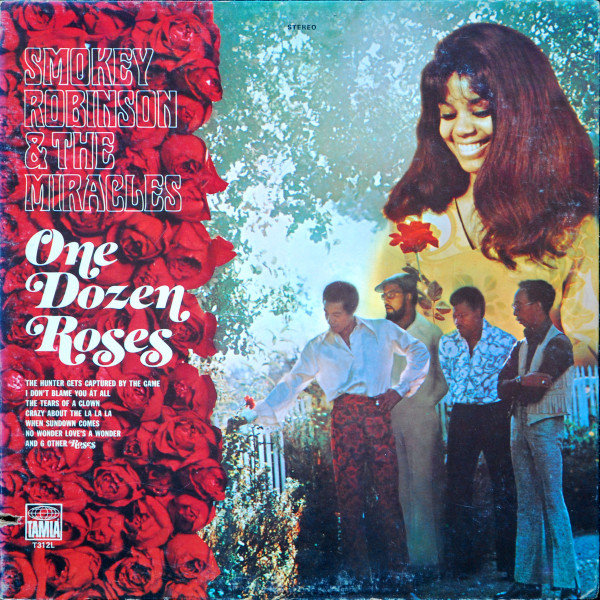 Dipping into his own songbook, Smokey pays homage to The Marvelettes with “The Hunter Gets Captured By The Game” and Claudette can be heard with her husband on a cover version of Paul Simon’s “Cecilia”. The overall feeling of “One Dozen Roses” was emotional and comforting, as loosely depicted by the front cover where Claudette is holding a solitary rose picked by her husband. “…A surprisingly great album and represents the last vestiges of the sixties Motown sound…” and “Their legacy was cemented for life”, were just two of the printed reviews.
Dipping into his own songbook, Smokey pays homage to The Marvelettes with “The Hunter Gets Captured By The Game” and Claudette can be heard with her husband on a cover version of Paul Simon’s “Cecilia”. The overall feeling of “One Dozen Roses” was emotional and comforting, as loosely depicted by the front cover where Claudette is holding a solitary rose picked by her husband. “…A surprisingly great album and represents the last vestiges of the sixties Motown sound…” and “Their legacy was cemented for life”, were just two of the printed reviews.
After a run of three successive single re-issues, Tamla Motown eventually joined real time by lifting “I Don’t Blame You At All” for release. In the meantime, Smokey needed to complete recording “Flying High Together” before finally returning to family life. (As an aside, The Miracles did survive with Billy Griffin, as one of their runaway hits was the disco-flavoured “Love Machine (Part 1)” which peaked in the UK top three, and the US top spot, becoming a multi-million selling platinum single.)
The Miracles’ last two singles to feature Smokey on lead were produced and co-written by Johnny Bristol, namely, “We’ve Come Too Far To End It Now” and “I Can’t Stand To See You Cry”, both with lush string arrangements so favoured by Mr. Bristol. Both helped push the sales of “Flying High Together” in 1972.
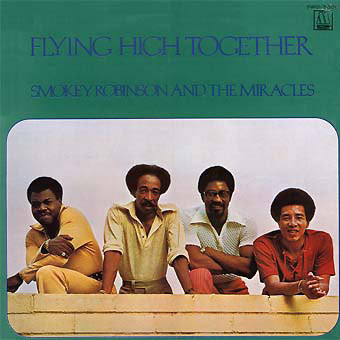 For this project no tracks were penned by Smokey, although he produced a couple – Michael Jackson’s “Got To Be There” and “Theme From Love Story”. Claudette said she welcomed working with different producers: “It was like a new adventure and a little exciting.” “A bittersweet moment for the group…and there were several crown jewels (like) the two singles..” and “remakes of The Chi-Lites’ ‘Oh Girl’ and The Stylistics’ ‘Betcha By Golly Wow’ (don’t) come close to the originals but the group do a fairly good job on them” were among the critiques.
For this project no tracks were penned by Smokey, although he produced a couple – Michael Jackson’s “Got To Be There” and “Theme From Love Story”. Claudette said she welcomed working with different producers: “It was like a new adventure and a little exciting.” “A bittersweet moment for the group…and there were several crown jewels (like) the two singles..” and “remakes of The Chi-Lites’ ‘Oh Girl’ and The Stylistics’ ‘Betcha By Golly Wow’ (don’t) come close to the originals but the group do a fairly good job on them” were among the critiques.
Within two months of hanging up his microphone and dancing shoes, Smokey had moved from Detroit to Los Angeles, after months of badgering from Berry Gordy, who – by all accounts – told him, “if you want to be a solo artist and start recording and touring again, you need to move to the City of Angels.” Working with Marv Tarplin again, he released his debut solo album “Smokey” where he shared production credits with Willie Hutch. A new adventure began.
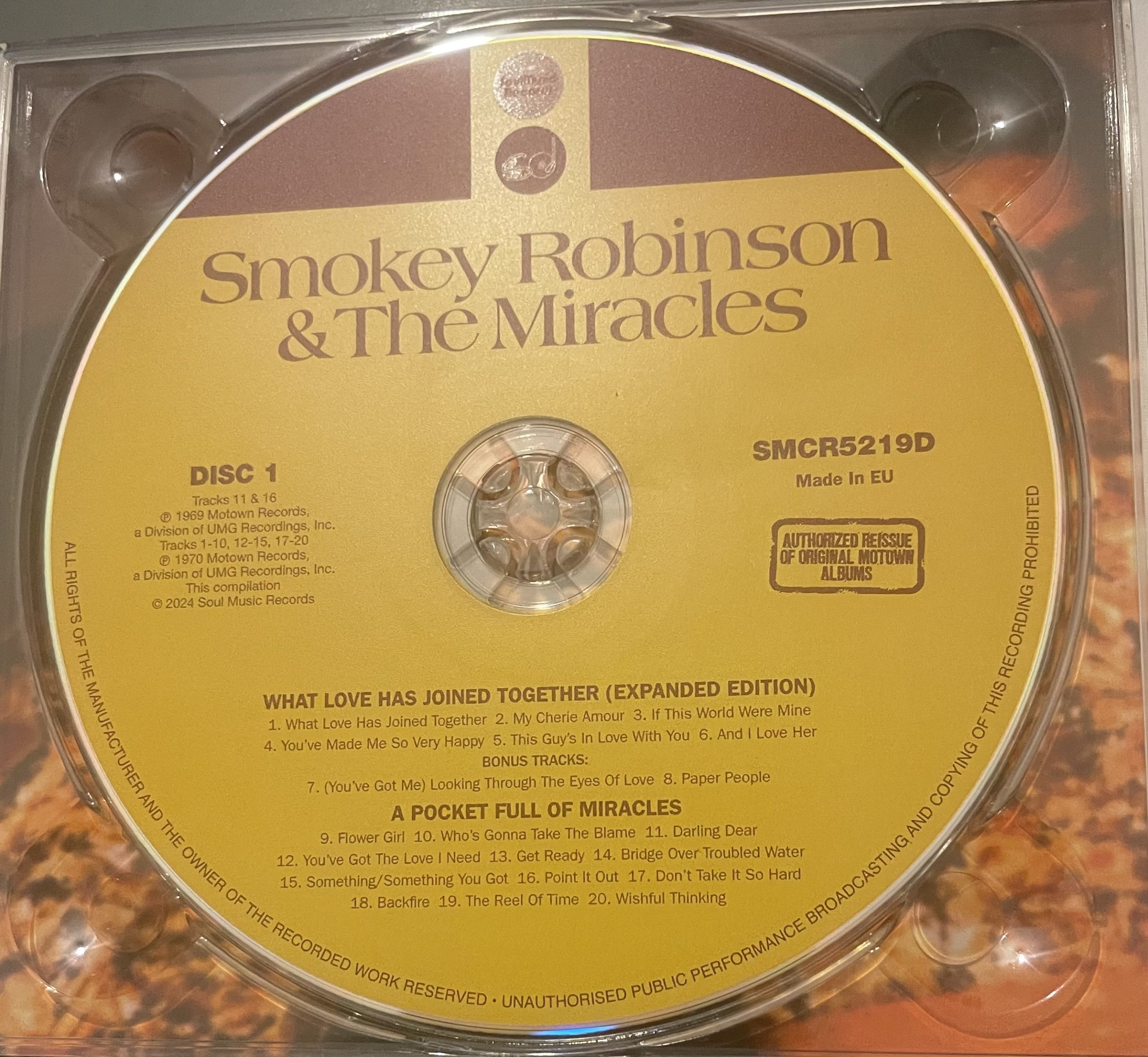
 SoulMusic Records‘ founder David Nathan, our guardian angel of Motown re-issues (along with Joe Marchese of The Second Disc) told me it had taken around two years to get clearance for “Smokey Robinson & The Miracles”, and now that it has actually materialised we shouldn’t assume that more will follow. However, he has another project currently waiting for the green light, but I don’t know that I can tell you who it is! Meanwhile, we have cause for celebration with “Smokey Robinson & The Miracles” as it covers the changing sound and influences of a group that helped style early Motown which led to them being considered one of the most influential groups in the history of pop, soul and R&B. Says Claudette, “I’m very proud of our history and extremely proud of our guys.”
SoulMusic Records‘ founder David Nathan, our guardian angel of Motown re-issues (along with Joe Marchese of The Second Disc) told me it had taken around two years to get clearance for “Smokey Robinson & The Miracles”, and now that it has actually materialised we shouldn’t assume that more will follow. However, he has another project currently waiting for the green light, but I don’t know that I can tell you who it is! Meanwhile, we have cause for celebration with “Smokey Robinson & The Miracles” as it covers the changing sound and influences of a group that helped style early Motown which led to them being considered one of the most influential groups in the history of pop, soul and R&B. Says Claudette, “I’m very proud of our history and extremely proud of our guys.”
And rightly so Claudette.
Sharon Davis




